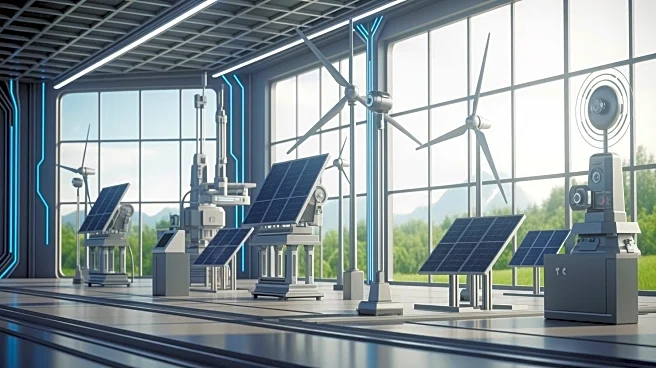What's Happening?
The United Kingdom has announced a comprehensive national plan to recruit and train hundreds of thousands of workers for industrial jobs in the burgeoning clean energy sector. This initiative is driven
by increased public and private investments in renewable and nuclear energy, leading to a heightened demand for skilled workers such as plumbers, electricians, and welders. The plan includes the establishment of five new colleges dedicated to training young individuals for careers in clean energy. Additionally, a national program will facilitate job connections in areas like solar installation, wind turbine manufacturing, and nuclear power. The initiative also aims to support ex-offenders, school leavers, and the unemployed, while upskilling current workers transitioning from oil and gas to roles in offshore wind, nuclear energy, and the electricity grid. Energy Secretary Ed Miliband emphasized the potential of the clean energy jobs boom to provide good industrial jobs, with a target to double sector employment to 860,000 by 2030.
Why It's Important?
This initiative is significant as it addresses the growing need for skilled labor in the clean energy sector, which is crucial for the UK's efforts to decarbonize its electricity sector by 2030. By investing in workforce development, the UK aims to meet climate targets, enhance energy security, and reduce power costs by decreasing reliance on fossil fuels. The plan also ensures that companies receiving public funding offer fair pay and strong workplace protections, which could lead to improved labor standards across the sector. The anticipated increase in clean energy jobs not only supports environmental goals but also promises economic benefits by creating sustainable employment opportunities.
What's Next?
The UK government will focus on implementing the training programs and establishing the new colleges to facilitate the transition of workers into the clean energy sector. Monitoring the progress of these initiatives will be crucial to ensure the target of doubling jobs in the sector by 2030 is met. Stakeholders, including educational institutions, industry leaders, and policymakers, will likely collaborate to address any challenges in workforce development and ensure the successful integration of new workers into the clean energy industry.
Beyond the Headlines
The initiative may have broader implications for social equity, as it includes support for marginalized groups such as ex-offenders and the unemployed. By providing these individuals with access to training and employment opportunities, the plan could contribute to reducing social disparities and fostering inclusive economic growth. Additionally, the focus on fair pay and workplace protections may set a precedent for labor standards in other sectors, potentially influencing broader policy changes in employment practices.









